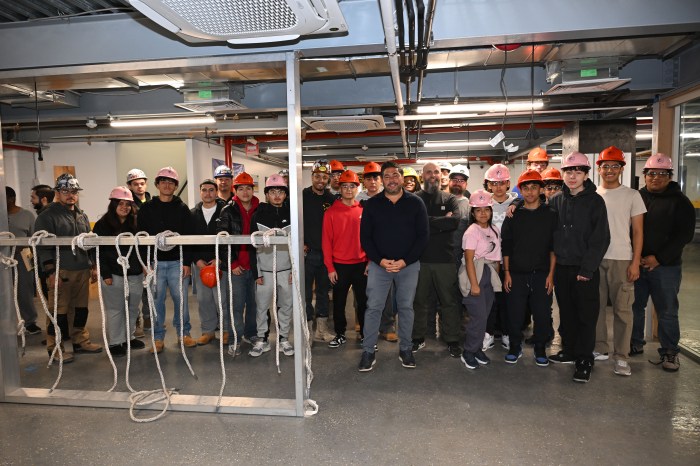Freshmen at Richmond Hill High School may soon have to don their jackets just to get to class.
Across the borough, Temporary Classroom Units (TCUs) are used to supplement classroom space to accommodate the massive number of students coming in.
Richmond Hill High School, one of these schools, currently has 11 TCUs, a Department of Education (DOE) spokesperson said, and eight of those have recently been replaced due to wear and tear.
While students find only some problems with the units, the United Federation of Teachers (UFT) says the trailers do not provide the right atmosphere for learning.
“The UFT has received numerous complaints about these trailers and their current conditions — most of them are over 10 years old,” a May report read. “Providing instruction under sub-standard conditions compromises children’s education. Parents need to know what is going on in their schools and the earlier in the school year, the better.”
The study concluded that the number of these temporary classrooms had dropped little over a 10-year period, from 2001 through 2011. Ten years ago 3.9 percent of permanent students — at elementary and high schools — were in temporary classrooms, according to the UFT report. Since then, the number has only dropped by about 1,000 students, to 2.9 percent.
Because of poor conditions in the trailers boroughwide, the facilities had been failing over time, affecting the quality of education.
James Vasquez, the Queens high school district representative for the UFT, said the problem with these trailers was the notion that they were a temporary correction to a larger problem. Although referred to as temporary, Vasquez said trailers have been at some high schools for up to 15 years.
“These trailers are not holding up well, so what do they do over the summer? They replace them with new trailers,” he said. “These temporary trailers have really become permanent fixtures in many of these schools.”
The DOE was not able to respond for comment regarding the department’s time frame on how long these classrooms would be there.
Students at the school don’t seem to mind the trailers, with the exception of a few complaints.
Suraia Munia, now a senior, said she had classes in these units as a freshman, and didn’t mind the conditions, only that transferring from place to place could be a hassle.
“I think the condition was not bad,” said Munia, 18. “It was kind of hard because afterward I had to go to the third floor and it takes time to go to the third floor from outside. [When it was winter] we had to get our jackets and everything when we were going to the trailers. Right now they’re making changes in the classrooms in the trailer. I think they’re trying to make it better.”
Other students, like Chris Leom, a sophomore who was in one of the units last year, said that while conditions are bad, the difference in education does not have much of a difference, possibly even better.
“[Teachers] will actually say ‘Chris why aren’t you doing your work.’ They actually care about their students,” he said. “You can actually learn something and have a teacher that makes you want to actually do work. The only downside about classes outside that it was cold, snowing or it’s a rainy day, but other than that I loved the trailers. The trailers were better in technology; they have air-conditioning and they had smart-boards and the same thing they have inside.”
— With additional reporting by Sweetina Kakar


































